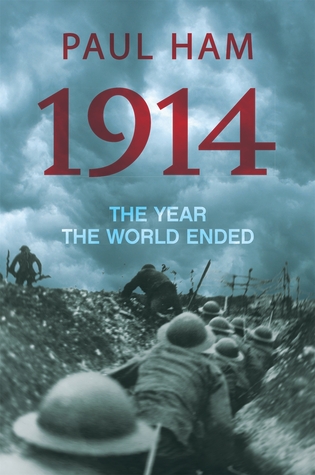Posted: April 10, 2014
 Few years can justly be said to have transformed the earth: 1914 did.
Few years can justly be said to have transformed the earth: 1914 did.In July that year, Germany, Austria-Hungary, Russia, Britain and France were poised to plunge the world into a war that would kill or wound 37 million people, tear down the fabric of society, uproot ancient political systems and set the course for the bloodiest century in human history.
In the longer run, the events of 1914 set the world on the path toward the Russian Revolution, the Treaty of Versailles, the rise of Nazism and the Cold War.
In 1914: The Year the World Ended, award-winning historian Paul Ham tells the story of the outbreak of the Great War from German, British, French, Austria-Hungarian, Russian and Serbian perspectives.Along the way, he debunks several stubborn myths.
European leaders, for example, did not stumble or ‘sleepwalk' into war, as many suppose. They fully understood that a small conflict in the Balkans – the tinderbox at the heart of the continent – could spark a European war. They well knew what their weapons could do.
Yet they carried on. They accepted – and, in some cases, even seemed to relish – what they saw as an inevitable clash of arms. They planned and mapped every station on the path to oblivion. These pied pipers of the apocalypse chose war in the full knowledge that millions would follow, and die, on their orders.
1914: The Year the World Ended seeks to answer the most vexing question of the 20th century: Why did European governments decide to condemn the best part of a generation of young men to the trenches and four years of slaughter, during which 8.5 million would die?
HUBBY'S REVIEW:
It is hard to believe that in August it will be 100 years since the beginning of the First World War. This book 1914 takes a look at all of the causes or so called causes of the war. The author starts back 100 years and works forward with all of the different wars that had taken place. But I did notice he always came back to a treaty after a war in 1870-1871, where some prime land was taken from Germany and made French. Over the course of years this became just one of the items that upset German leadership. They also felt that they were always being pushed aside when other countries got together for a conference or would sign a treaty. In 1900 France and Russia signed a treaty and they both bordered Germany. Feeling pressure at this time Bismarck started to build up his army and his Navy. Surprisingly none of the other countries were paying any attention. From that moment things just got worse because he died and a younger Bismarck came into power and Russia had a change in power. Now France made an agreement with Britain about territory in North Africa and once again Germany was left out. Though the Queen of England was the Grandmother to the new leader in Germany she had no say over what the country did the Parliament along with the Prime Minister really controlled the political landscape and no one was really listen to what Germany had to say. There was in 1908 some talk between two diplomats, Count Alois Lexa Von Aehrenthal the Austrian foreign minister and his Russian counterpart Alexander Izvoisky. They were getting together because of an agreement was to expire on what to do with Bosnia. These talks went on for years with no solution other than the Austrians’ and Germans, feeling like they were being taken advantage of and no agreement was done in the end. During this time there was one time when the Russians sank a German vessel which actually could have led to war but was worked out. By the time Prince and his wife were assassinated there was no more time for talk. France and Russia had increased the railroads along the borders of Germany and with everything happening Germany attacked France. One thing I will say is that medical science from back then was that. The men who were in the trenches with sustained artillery attack. (Mostly affects the brain and central nervous system). Men who broke down were sent back to the front lines this was sane thinking. Today this we know is post-traumatic stress disorder. To abnormal events and shelling, mass slaughter is not normal but was deemed normal then. Many men after the war who spent a lot of time in the trenches had headaches, nightmares, and bouts of depression. This also does not include the men who served from mustard gas. The author also points out that that really he thinks both wars are really together for nothing was learned from the first. I would have say I agreed since my father fought on some of the very same land as the first war when he fought in WWII. This is a very in depth look into the begging’s of the first war. Not any battles but the history and politics and not just saying that the death of a Prince and his wife can start everything into motion. He takes you back into all of the changes of Europe leading up to that event and how each time when they could have talked they did not. I thought this was a very through book and was well written about an important part of history. I got this book from net galley.




No comments:
Post a Comment
We ask that when you are leaving a comment that you are remebering that children may be reading this blog, without the knowledge of a consenting adult. We all put our disclaimers on to get into the sites but kids are smart. Please be aware when posting to use safe language and pics. Thanks :)